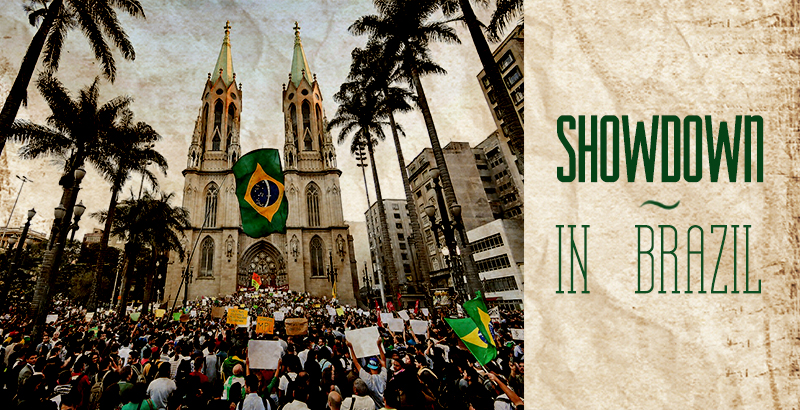
Written by Vinicius exclusively for SouthFront
Brazil, the 8th largest economy in the World is currently undergoing many problems as the country no longer enjoys favorable international trade conditions for its products and is now having to pay for years of high expenditures.
For many years Brazil enjoyed the benefits of high commodity prices and took advantage of the goodwill of investors, what enabled the country to raise cash in the markets. However, as the favorable scenario gave way to lower demand and prices for commodities, less credit, and lower investments, the country started facing huge problems in financing its debt.
As much as it is true that the Brazilian debt is not as big as the one of many western nations, as a percentage of GDP (around 60%), it is also true that it is very expensive to service. Right now interest rates have risen to 15% a year, what provokes the consumption of all federal disposable budget resources on debt payments. As a consequence, all investments, and many federal programs have been stopped.
Coupled it the economic hardships, Dilma Roussef´s government faces the largest corruption scandal ever exposed in the country and a major dissatisfaction of the population with an approval rating of only 8% of the population.
Many policies developed during the Workers Party´s administration, since 2002, have resulted in the creation of a strong division in the Brazilian society. Agricultural producers, middle class workers, whites, traditional families, Christians, and many other groups have been the target of hate movements and legislation from the Worker´s Party governments, which claims to hold a leftist ideology. In the other hand, the war on corruption and amelioration of life conditions of the population have not been delivered and almost half of federal budget is directed to paying debts to private banks.
All those shortcomings from the administration of the Worker´s Party have produced a great dissatisfaction on the population which culminated in President Roussef´s current term. Many popular and political movements now demand that the government be impeached and even request military intervention.
As Brazil is an important pillar of the BRICS arrangement, an eventual fall of President Dilma´s government might have important geostrategic consequences, especially considering the importance the country has in supporting independent nations such as Venezuela, Bolivia and Ecuador. A fall of the Brazilian government will be beneficial to the United States as it will weaken not only the BRICS block, and especially Russia, but also the independent South American countries.
It is clear that movements which wish to topple the government are very well organized. On the other hand, their demands are legit and the government ignores them, disregarding the popular dissatisfaction with current policies. There is, therefore, a feeling that this situation is unsustainable and that at some point the government will fall. We will have to wait and see how this process will evolve.




This was an excellent annalist write-up. Thank you.
The author clearly has a biased (neoliberal) opinion and against BRazil. Regarding internal debt, US debt is 300% of GBP. What about it?. The corruption exist since ever, but now the corrupt are being hunted. Fighting back, these guys try to create political instability in order to escape from trial. In the confusion, and backed by companies like ENRON, they try to give the brazilian oil to the American Oil companies and to stop the development projects, including nuclear submarine and many others. About the investment showed like “wasted money”, the strategy is the same of China now: develop internal market as a way to survive to external variations. In that effort, 40 millions of starving people were moved to middle class (an accomplishment that any human being shall approve!)). For each dollar invested, Brazil got 1,45 in return. Today, Brazil is in top 5 countries in foreign investment in the world, low internal debt compared to other countries, and with reserves 10 biggests that 10 years ago. Today is not longer debtor of the IMF, now lends money to them! Also is co-founder of a new world bank.
The development of south amercian was considered a “threat” for the security fo the US in the 80s. Today, there are US$4 billions of US investment to destroy leftish goverments in south america. The reflects of that efforts we can see on the midia and … in articles like this.
70% of articles about national debt is focused only at the USSA.
This article is about a different country. Their is after all more then one nation.
Example:… If you read an article of National Geographic focused on Brazil, do not write them to complain that they should have written about Yemen.
As that particular article was focused on Brazil.
That is all, don’t get so offended.
You know, Brazil is not perfect, so stop being so offended.